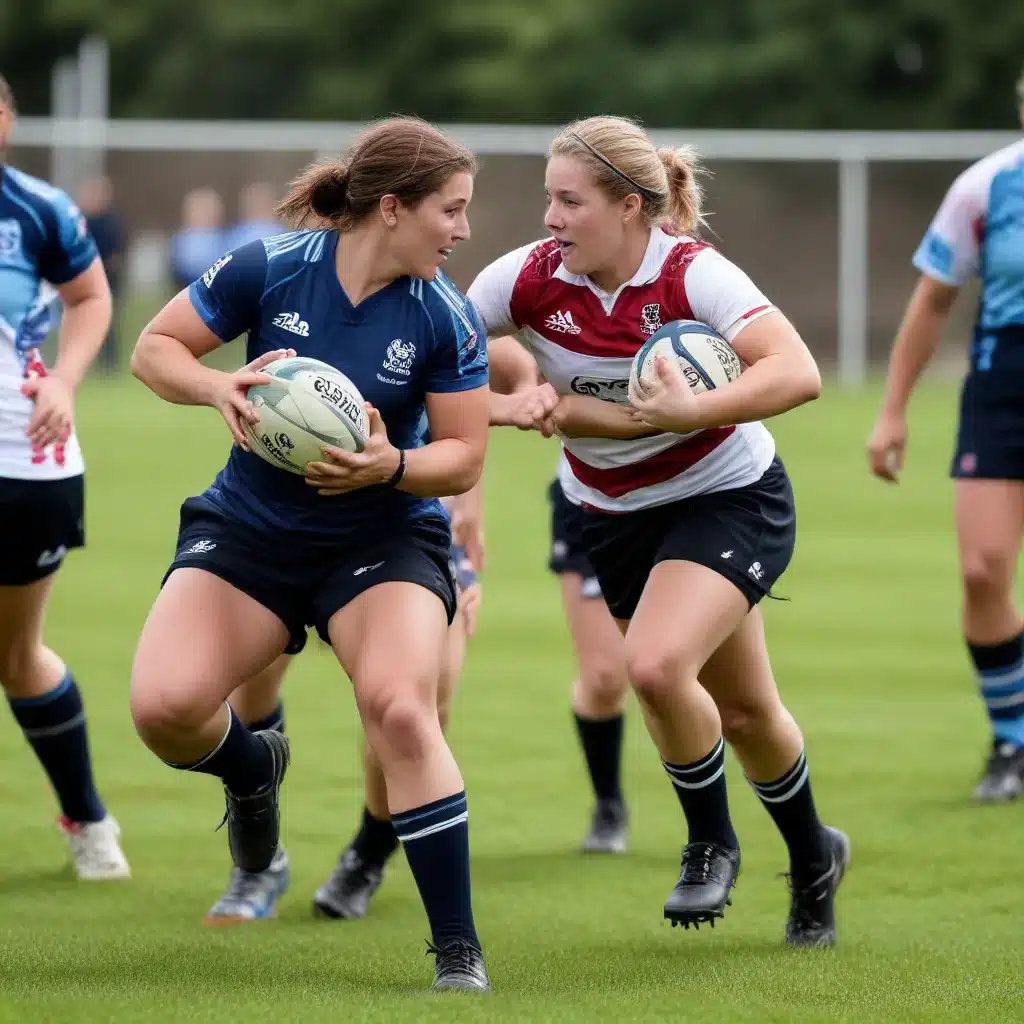
The Importance of Community in Women’s Rugby
Community is the lifeblood of women’s rugby. By fostering a supportive, inclusive environment, rugby clubs can cultivate a profound sense of belonging that inspires participants to get involved and stay engaged with the sport. This community-driven approach is essential for overcoming the barriers that have historically limited women’s participation in rugby.
Societal perceptions and biases have long cast shadows over women’s sports, with rugby often viewed as a “male-dominated” domain. However, by actively engaging with the local community, women’s rugby clubs can challenge these outdated notions and showcase the sport’s empowering potential for players of all backgrounds. Through youth development programs, partnerships with local organizations, and outreach initiatives, clubs can introduce the game to a wider audience and provide role models that inspire the next generation of female athletes.
Overcoming Barriers to Participation
One of the key barriers to women’s rugby participation is the lack of visibility and access to resources. Many clubs have struggled to secure adequate funding and infrastructure to support their women’s teams, hindering their ability to offer quality training, facilities, and competitive opportunities. By fostering strong community connections, however, clubs can leverage local support and tap into alternative funding sources, such as sponsorships and community grants, to overcome these challenges.
Equally important is the role of coaches and administrators in creating an inclusive, welcoming club culture. By providing mentorship, skill development, and a genuine commitment to equity, these leaders can empower female players to thrive, both on and off the pitch. When women feel valued, respected, and empowered within their rugby community, they are far more likely to continue participating and sharing their passion with others.
Benefits of Community Engagement
The benefits of robust community engagement in women’s rugby are profound and far-reaching. As participation and retention rates increase, the sport experiences exponential growth, attracting new players and fans alike. This surge in engagement not only strengthens the women’s game but also has a positive impact on the physical and mental well-being of the players themselves.
Rugby, with its emphasis on teamwork, discipline, and physical fitness, has been shown to boost confidence, leadership skills, and overall life satisfaction among its participants. By embedding the sport within a supportive community context, these benefits are amplified, as players find themselves surrounded by like-minded individuals who share their passion and goals.
Measuring the Impact
Quantifying the impact of community engagement in women’s rugby is crucial for both celebrating successes and identifying areas for further improvement. Key performance indicators might include participation rates, demographics, player satisfaction and retention, and shifts in community perceptions and attitudes towards the sport.
Tracking these metrics can provide valuable insights that inform the development of targeted outreach programs, coaching initiatives, and infrastructure investments. It also helps to demonstrate the tangible social value that women’s rugby brings to local communities, strengthening the case for increased funding and resource allocation from governing bodies, sponsors, and other stakeholders.
The Role of Coaches and Administrators
Coaches and administrators play a pivotal role in fostering community engagement within women’s rugby. By developing inclusive and welcoming club cultures, they set the tone for how players and supporters experience the sport. Providing mentorship, skill development, and a genuine commitment to equity helps to empower female participants, instilling in them a sense of belonging and purpose.
Beyond the confines of the pitch, these leaders also serve as advocates for the women’s game, leveraging their influence to secure equitable resources and recognition. By collaborating with other clubs, sharing best practices, and utilizing digital platforms to amplify their message, they can build a stronger, more connected rugby community that celebrates the achievements and potential of female players.
Collaboration and Knowledge Sharing
Effective community engagement in women’s rugby relies heavily on the ability of clubs and organizations to collaborate and share knowledge. By networking with peers, coaches and administrators can learn from one another’s successes and challenges, identifying innovative strategies to overcome common obstacles.
The use of social media and digital platforms has been instrumental in facilitating this exchange of ideas and best practices. Online forums, webinars, and virtual communities allow rugby enthusiasts from across the globe to connect, discuss pressing issues, and collectively work towards the advancement of the women’s game.
Challenges and Barriers to Community Engagement
Despite the profound benefits of community engagement, women’s rugby clubs often face significant challenges and barriers in their efforts to foster these connections. Limited funding and resources continue to hinder the development of robust outreach programs, youth initiatives, and accessible facilities.
Additionally, deeply rooted cultural and societal biases can prove difficult to overcome, as entrenched perceptions of rugby as a “male-dominated” sport persist. Geographical limitations and infrastructure constraints also pose barriers, as clubs in rural or underserved areas may struggle to reach and engage with their local communities.
Strategies for Overcoming Challenges
To address these challenges, women’s rugby clubs must be proactive and innovative in their approach to community engagement. Seeking alternative funding sources, such as corporate sponsorships, community grants, and crowdfunding campaigns, can help to supplement limited budgets and enable the implementation of impactful programs.
Engaging with local decision-makers, community organizations, and schools can also open doors to new partnership opportunities, allowing clubs to leverage existing infrastructure and networks to expand their reach. And by tapping into the passion and dedication of volunteers, clubs can amplify their community efforts without relying solely on paid staff and limited resources.
Ultimately, the success of community engagement in women’s rugby hinges on the collective efforts of coaches, administrators, players, and supporters. By working together to overcome obstacles, celebrate successes, and continuously innovate, the rugby community can cultivate an environment that empowers and inspires women of all ages and backgrounds to embrace the sport and reap its countless benefits.
